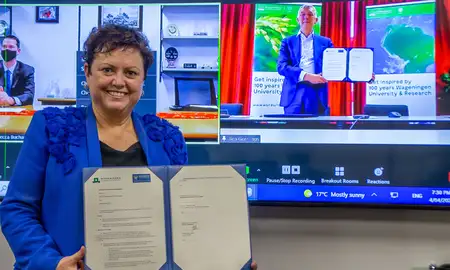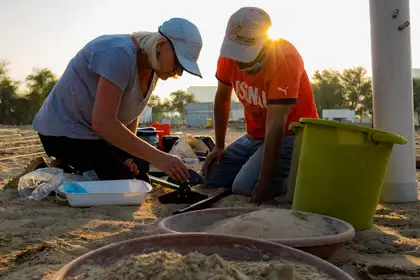
OnlyfromNZ Project Manager Lesley Kennedy discussing the field conditions with PhD student Mansoor Al Tamimi prior to installing devices
The UAE has a hyper-arid climate with little rainfall, extremely hot summers, and no surface-water resources. Groundwater is the only available resource for agricultural irrigation in the UAE and the groundwater in Abu Dhabi is also saline, particularly in farming areas. Protecting groundwater quantity and quality is critical.
To combat the problem of salinity and lack of groundwater, the UAE government is promoting the use of small-scale desalination plants to produce freshwater to irrigate high-value crops. However, the desalination plants pose an environmental threat as the reject brine, which is very high in salinity, has to be disposed of, typically onto land which then increases the salinity problem.
Mansoor’s proposed solution is to measure and model the salt leaching effect under salt-tolerant crops cultivation irrigated with saline water resources (saline groundwater, reject brine from desalination, saline aquaculture effluents), so that the value of the use of irrigation is enhanced and the environmental impacts are minimized.
Since 2014, the International Centre for Biosaline Agriculture (ICBA) in Dubai has developed an Integrated Agri-Aquaculture System (IAAS) as a novel way to make use of the reject brine from desalination, combining fish and halophytes (salt-loving plants) farming. Nutrient-rich aquaculture effluents (known as Aquabrine) are used to irrigate halophytic crops for food and fodder production in the open field. Such practices could potentially increase salinity of the groundwater if large volumes of drainage water are being generated from poor irrigation management practices.
Mansoor says “my dissertation work is to assess the environmental impacts of IAAS and the use of the reject brine from desalination units and propose the most appropriate management for its sustainable use”.
The halophytic crops initially grown under this project were quinoa, blue pannicum and salicornia. After the first pilot study, Mansoor found that salicornia was the most salt-tolerant crop to continue with the study.
“Salicornia is a versatile crop in that it can be mainly used for food and fodder, so if we can effectively utilise highly saline wastewater to produce this crop in an environmentally sustainable manner (minimising environmental impacts), then we are providing a solution that strengthens the food security agenda and environmental objectives of the UAE.”
Through the current project Mansoor intends to maximize the utilization of the reject water from desalination plants on farms to provide additional value through growing food and fodder crops as continuation of the EXPO LIVE project that was implemented in 2019-2022 with similar scope.
“The national system for sustainable agriculture, through the combined efforts of all governmental and non-governmental agencies seeks to increase self-sufficiency from the targeted crops to 5 per cent annually and achieve a 15 per cent annual reduction in water used for irrigation,” Mansoor adds.
The project and its success will be presented to the responsible authorities in the country, such as the Ministry of Environment and Climate Change, which is responsible for the food security file, as well as the local authorities in the Emirate of Abu Dhabi responsible for agriculture such as Abu Dhabi Agriculture and Food Safety Authority (ADAFSA).
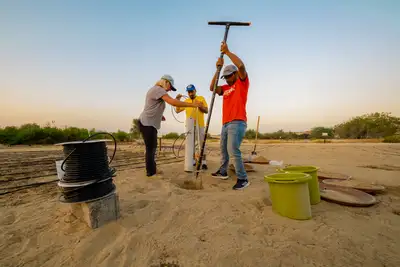
OnlyFromNZ Project Manager Lesley Kennedy, Dr Ahmed Muaini and PhD Student Mansoor Al Tamimi start excavation to prepare fluxmeter
Mansoor is a doctoral candidate in a joint research programme run by Massey University and Plant & Food Research. This is part of a Government-to-Government (G2G) collaboration between the New Zealand government and the UAE government.
The key UAE entity and funder is Environment Agency-Abu Dhabi (EAD), with the New Zealand partners being Plant & Food Research and OnlyFromNZ. The research is being carried out in partnership with the International Centre of Biosaline Agriculture (ICBA) near Dubai.
His PhD Co-Supervisor, Head of Agriculture and Environment, Professor Paul Kenyon says this tripartite partnership is producing vital research that benefits the agricultural industry globally.
“This type of collaborative post-graduate programme and research project utilises the skill sets of both countries to address an important environmental issue with the long-term aim of allowing UAE to be more sustainable in food production and water use.”
“These types of collaborations with industry partners enhance the reputation of both Massey University and Plant & Food Research as innovative research and educational organisations, with the capability to address international issues- on the ground overseas,” he says.
Mansoor values being a part of the programme. “This PhD partnership gives me access to some of the best agricultural scientists while applying our academic knowledge to real field work at ICBA in the UAE,” he says.
Principal Scientist at Plant & Food Research and Project Lead, Dr Brent Clothier has nine years of experience with G2G, researching water use policies and practices in the UAE to conserve fragile water resources. Lesley Kennedy, a Director with OnlyFromNZ, is the Project Manager.
Dr Clothier applies his knowledge of environmental physics to aid Mansoor with his hands-on research project at ICBA in the UAE using newly developed technologies to measure the leaching through the root zone with flux meters, and the soil water content of the saline soils by modified Time Domain Reflectometry (TDR).
“My colleague Dr Steve Green and I are using our TDR devices to measure soil water content changes and changes in salinity along with Mansoor. We are also using our drainage fluxmeter devices with him to measure water drainage and salt leaching under the Salicornia crop,” Dr Clothier says.
With remote learning, a trademark of Massey University, Doctoral Co-supervisor, Professor of Pasture Science Peter Kemp is confident in Mansoor’s success despite being in the UAE.
“The supervisory support of UAE PhD students is an excellent example of international collaboration. Massey provides experienced supervisors as well as putting guidance and support in place to assist with the production of an international standard PhD.
“The supervisors from Plant & Food provide supervisory support and scientific leadership in the UAE and New Zealand and the local UAE supervisor in EAD ensures there is continuous local support and context. Of course, with internet communication, no one is far away,” Dr Kemp says.
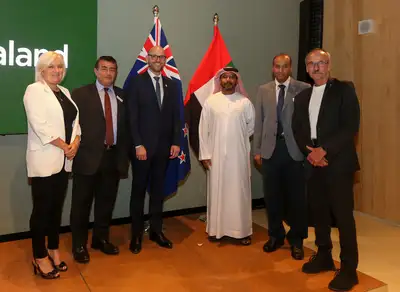
Project Manager Lesley Kennedy, Dr Mohamed Abdel Hamyd Dawoud, New Zealand Ambassador to the United Arab Emirates and Qatar Matthew Hawkins, PhD Student Mansoor Al Tamimi, Groundwater Project Manager Wasel Abdelwahid Abou and Dr Brent Clothier
More news
Exploring climate change from beneath
Self-declared ‘fish nerd’ Dr Irene Middleton is a marine ecologist with a passion for educating and connecting people with the ocean and its creatures for the purpose of conservation.
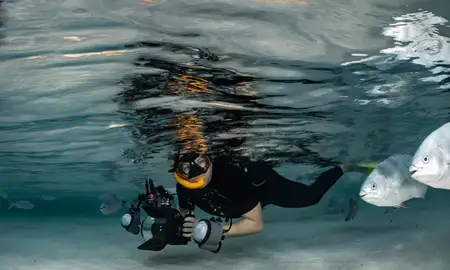
Hunga Volcano eruption and its once-in-a-century atmospheric wave
Hunga Volcano in the Kingdom of Tonga began a new eruptive sequence on 19 December 2021, culminating in the climactic eruption on 15 January 2022.
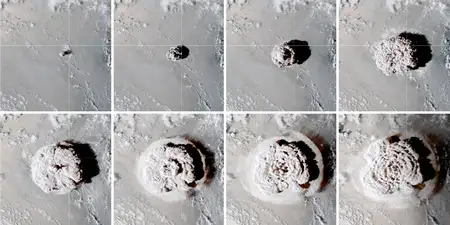
Massey renews agreement with world-leading Dutch university
Massey University has renewed its Strategic Cooperation Agreement with Wageningen University & Research in a virtual signing ceremony.
